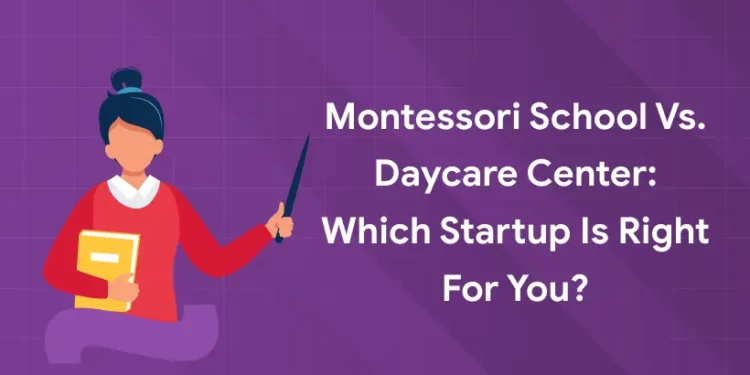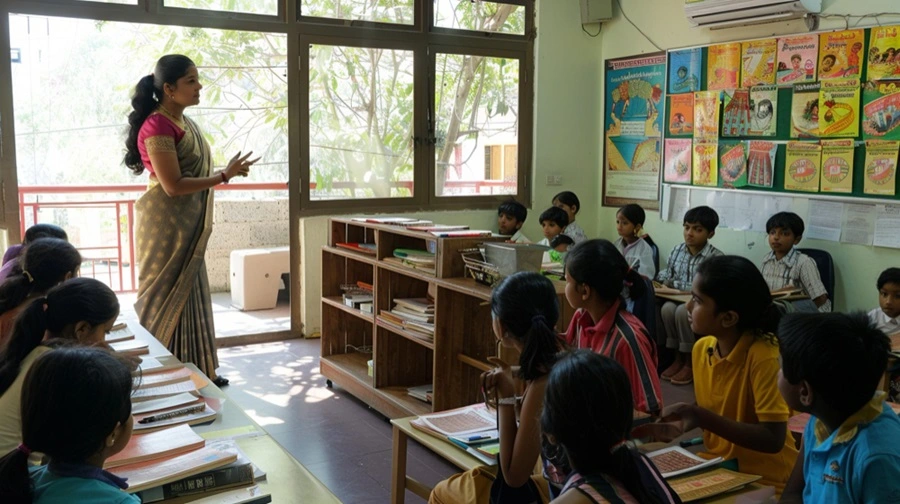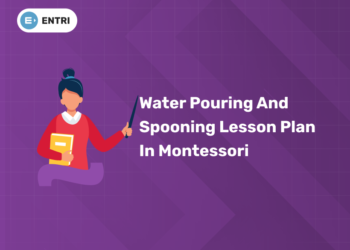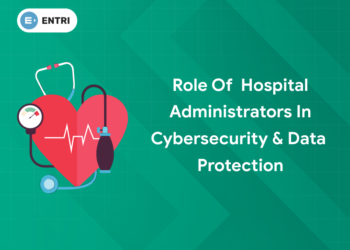Table of Contents
Starting a business in early childhood education – whether a Montessori school or a daycare center – is a super rewarding and impactful experience. These two options serve young kids and families, but at their core they have fundamentally different philosophies, settings, expectations, regulations, costs, staffing, and longer term impacts. The choice of which to start depends on what really gets you fired up, what you want to achieve, your skills, the resources at your disposal, what the community needs and ultimately your long term vision.
This guide will walk you through every aspect of the difference between Montessori schools and daycare centers, helping you figure out which one is right for you. Its written with everyday people in mind, parents who are looking into new opportunities, people who want to become Montessori teachers and students thinking about a Montessori teaching course in their future. We’ll also show how the Entri Montessori Teacher Training Course fits into building a successful Montessori business.
Want to conduct a Montessori vs daycare market analysis? Learn the Montessori principles first!
Montessori School vs. Daycare Center: Introduction
Most often people mistake Montessori schools and daycare centres as the same. But that is not the truth. They have ocean-wide differences in their working philosophy and training methods. Choosing between Montessori and daycare can be difficult. Whether you are an entrepreneur confused about what franchise you should start or a parent looking into educational options for your children, this dilemma is not easy to solve. In this blog, we will help you understand the differences by making a “Montessori vs daycare pros and cons” comparison.
What is a Daycare Center?
1: What is the primary focus of the first plane of development in the Montessori method?
The goal of daycare centers is to provide for the needs of kids who need attention and guidance. These facilities may include family childcare homes or nannies, among other arrangements. However, center-based arrangements, such as childcare centers and preschools, are the most widely used options. Daycare facilities frequently provide a more lively and playful setting that prioritizes socialization and group activities.
Get the best mentors to learn Montessori practical activities from! Join Entri Elevate!
Get Certified & Start Your Montessori Career
Montessori Teacher Training Course by Entri App: Gain expert skills, earn certification, and kickstart your teaching career.
Join Now!What is a Montessori School?
Maria Montessori’s curriculum and philosophy serve as the foundation for Montessori education. Montessori schools offer a disciplined educational setting that emphasizes a child’s overall development. They furnish their well-prepared classrooms with materials that are tailored to the developmental needs of the children. Activities are created to enhance children’s development because the Montessori philosophy acknowledges that learning occurs through play.
Join the best Montessori teacher’s training course in Kerala! Click here to register!
Understanding the Key Differences Between Montessori Schools and Daycare Centers
Is “Montessori School vs. Daycare Center” even a relevant debate? According to educational research that has specifically examined the differences between Montessori schools and traditional daycare centers, parents and caregivers can anticipate significant differences between the two. Additionally, parents who send their children to Montessori schools should expect their child’s development to accelerate noticeably. Regardless of whether the daycare worker prioritizes education as part of their service, student outcome is a general term used to describe childhood development. It refers to the overall life, societal, and educational impacts that the child’s experience has. So let us look at the important differences between Montessori vs daycare education.
| Factor | Daycare Center | Montessori School |
| Philosophy | · Teacher-centred
· Structured activities and routines · focus on following instructions |
· Child-centred
· Self-directed learning · Importance for intrinsic motivation and exploration |
| Environment | · More colourful and playful
· designated areas for activities · age-appropriate toys and equipment · provides structured routines · focused on safety and supervision |
· Orderly
· aesthetically pleasing · child-sized furniture · promotes exploration · open space for movement · accessible materials |
| Activities | · Teacher-led
· group activities · songs · stories · play-based learning · pre-academic skills |
· Hands-on
· Sensorial · Concrete materials · Individual or small group work · Child-chosen activities |
| Developmental Focus | · Socialization
· Pre-academic skills · Emotional well-being · Following instructions |
· Holistic (physical, cognitive, social and emotional)
· Independence · Problem-solving |
| Teacher Role | · Caregiver
· Instructor · Leader of activities · Group supervision |
· Guide
· Observer · Facilitator · Individual support |
| Availability | · Widely available
· Have diverse program choices across communities |
· Less common
· Often needs seeking out such schools |
Montessori vs Daycare Comparison Table
These are the basic differences. Some more differences often go unnoticed. We will discuss some of them too in the Montessori vs daycare comparison table below.
| Feature | Daycare Center | Montessori School |
| Age group | · Separate classes for age groups | · Mixed-age groups classes |
| Academic Achievement | · Higher achievement gap between highest and lowest performing child | · Higher Academic achievement
· The low achievement gap between the highest and lowest-performing child |
| Social development | · Performance lower than Montessori students | · Better playground manners
· Gave more intricate answers to social problems |
| Study mode | · May prioritize compliance and obedience | · Promotes independence and self-regulation |
| student-to-teacher ratio | · High | · Low |
| Teachers’ education | · Teachers might not have appropriate training | · trained in Montessori pedagogy |
| Noise level | · Noisy
· Messier |
· Quieter
· Cleaner |
| Learning | · Instructure directed discipline | · Play-based learning |
| Behaviour instructions | · group conformity is promoted | · Taught to develop grace and courtesy |
| Assessment basis | · child’s well-being
· behaviour · social interactions · most often does not track academic progress |
· continuous observation
· portfolio development · teacher evaluations · developmental and academic progress tracked · provides detailed feedback to parents |
| Parent involvement | · practical matters like pickup and drop-off times are discussed
· updates on meals, activities and overall well-being provided |
· Encourage active parent participation by holding frequent workshops, conferences, and meetings.
· Parents are frequently asked to participate in their children’s educational journeys and watch them in the classroom. |
Get Certified & Start Your Montessori Career
Montessori Teacher Training Course by Entri App: Gain expert skills, earn certification, and kickstart your teaching career.
Join Now!Benefits of Starting a Montessori School
Now we are entering a new subsection of the debate i.e., ‘Montessori vs daycare for entrepreneurs. Montessori school business is a very bold and admirable step that a Montessori educator can take if they have strong conviction in their talent. Previously we have discussed Montessori school benefits for kids. Now we will discuss how good is a Montessori school as a business idea. Look at the following points.
Making a Change
You can introduce this child-friendly education philosophy to new communities and bring change to the lives of many parents and children.
Higher Enrolment Rates
In this age of academic competition, many parents choose to give their child a head start and hence in a well-off neighbourhood, a Montessori school tends to attract more clients and may have higher enrolment rates.
Professional Advancement
You can go from a junior Montessori educator to a school administrator in your Montessori profession. The only way to go beyond that is to start a Montessori school business. It will upgrade your career in every way possible. You will have a better income, better reputation better networking possibilities etc. You need a Montessori teacher training certification to start this journey. Have you heard of the Entri Elevate Montessori teacher training course? They offer online live and recorded classes, mentor support, placement assistance, PDF notes and certification recognised by international associations.
Upgrading
If you start a Montessori school, in a few years you can also begin a Montessori teacher’s training program and upgrade your institution. This will certainly grow the business.
Alternative Income Sources
You can organise webinars, seminars and workshops for parents of students, aspiring teachers and even parents of children not attending your school. You can sell childcare guidebooks, activity books, toys and other Montessori learning supplies via your website or school store. All of these ideas will generate alternative income.
Advantages of Launching a Daycare Center
Just like the Montessori school, the daycare centers too have their advantages. Some of them are discussed below.
Less Cost
As an entrepreneur, starting a daycare center is more economically easy than a Montessori school. Montessori school requires highly qualified teachers, expensive learning materials, a higher student-teacher ratio, a prepared environment, more accreditations etc. A daycare centre needs some workers, some toys and traditional learning materials, a low student-worker ratio and a safety licence. It could be started on a very small scale, even as small as from a home.
More Preference
If you open a daycare in a less affluent neighbourhood, you might have higher enrolment rates than a Montessori school. A daycare center often provides drop-in options, early morning shifts and late evening shifts. This is very helpful for parents who are working multiple jobs or in professions with very unpredictable shift timings. Oftentimes, these are the parents struggling to make ends meet. Therefore, the lower cost of tuition for a daycare center is also a blessing for them.
Join the best Montessori teacher’s training course of 2025! Join the Entri Elevate course now!
Montessori School vs. Daycare Center: What is Best for Your Child?
The decision between Montessori and daycare is ultimately a personal one, based on the requirements and values of your child. Although, both methods provide worthwhile early childhood experiences, knowing the unique benefits and factors to take into account will help you create the most supportive and motivating atmosphere for your child’s developing soul. Here are some more things to consider when you’re making your choice:
| Feature | Description |
| Child’s Temperament | Does your child prefer more structured activities or does he or she thrive on self-directed exploration? |
| Learning Style | Is teacher-led instruction or hands-on manipulation the way your child learns best? |
| Family Needs | Does your family value having a close-knit community or having flexible hours? |
| Budget | What is within your budget? Is it a daycare center or a Montessori school? |
Answering these questions will help you make a choice and help you overcome all confusion. It’s important to visit local Montessori schools and daycare centers. Get a sense of the general ethos and philosophy by asking questions, interacting with the teachers, and observing the classrooms. Keep in mind that the option that most closely aligns with your family’s early learning goals and your child’s unique needs is the best one.
It’s crucial to keep in mind that daycare and Montessori are not exclusive. Some families send their kids to daycare for a few days of the week and a Montessori program for the remainder.
In addition to accommodating different learning styles and giving families flexibility, this can provide a useful introduction to both methods. So, the debate of Montessori vs daycare for parents’ cases can be solved in this manner.
Montessori School vs. Daycare Center: Which Startup is Right for You?
The answer for Montessori School vs. Daycare Center dilemma is below.
| Factor | Daycare Center | Montessori School | Suggestions |
| Tuition Fees | · Lower | · Higher | Daycare seems to be chosen by clients looking for a more economical option. |
| Factors Affecting Cost | · General childcare services
· Facilities · Staff-to-child ratio |
· Specialized Montessori curriculum
· trained teachers · smaller class sizes |
Offering a Montessori education at the price of a daycare service will not be profitable. It requires trained educators, more expensive study materials, a lower staff-to-child ratio etc. |
| Additional Fees | · Meals
· Transportation · enrichment activities |
· Materials
· extracurricular activities · specialized programs |
Which among these options will be the priority of the people living in the location where you are choosing to open the school? |
| Availability of Financial Assistance | · Some facilities provide sliding-scale fees or take state subsidies. | · May differ; some institutions provide financial aid or scholarships. | Daycare centers take subsidies and hence can lower their fees to attract people looking for a less expensive option. |
| Flexibility | · may provide options for drop-in, full-time, or part-time care. | · Varies by school and may provide options for full-time and part-time enrollment. | The drop-in option is suitable for working parents with more unsure schedules or who has multiple jobs. |
| Location | · accessible in rural, suburban, and urban settings, prices vary according to location. | · Accessible in both urban and suburban locations, prices are higher in metropolitan areas. | The location of your institution is a very important part of the business plan. |
| Quality of Program | · offers general childcare services without a curriculum. | · Prioritizes holistic development, child-led activities, and individualized learning. | Daycares mostly just provide childcare facilities without making much contribution to a child’s academics. Montessori school are more of an academic institution rather than a childcare facility. |
Montessori vs Daycare Startup: Which is Best for You?
The Montessori vs daycare business questions answer heavily relies on the location of your choice and the type of community present there. From the table above we can clearly say that a Montessori school startup is more likely to be more profitable in a location where the community has at least an average income. Daycare center startup is a more suitable option in a neighbourhood where people want an affordable childcare facility during their working time. Daycares often provide a drop-in option which is very much appreciated by parents who want to balance multiple jobs or have erratic shift timings for their job. Therefore, opening a daycare center shall be more suitable in settings where people cannot afford a Montessori education.
Starting a Montessori school is more profitable in an urban or suburban location where the people in the community are more or less well-to-do. They are likely to prefer their child to get academic training earlier even if it might be slightly more expensive. In such cases, parents want to give children a head start in academics rather than have someone just provide a basic childcare facility.
But you can provide a good academic beginning to children attending a daycare too. To do this, you have to budget your Daycare center business carefully and make business plans in such a way that you can incorporate the Montessori method into the functioning of your daycare center business. You can even balance your carer-child ratio in such a manner that you can afford to hire one or two professionals trained in the Montessori teaching method, at least in a part-time. In this way, children attending your daycare can get the training and have learning opportunities that a Montessori-trained child has. Consider all these while choosing between Montessori school vs daycare.
Final Thoughts
When it comes to early childhood development, Montessori schools and daycare centers are both playing super important roles. Ultimately, your choice should come down to what genuinely speaks to you – your own passions, the needs of your community, what resources you have to draw from, your level of training, and where you see yourself in 5 years. Montessori schools are all about a deep down focus on long term growth and learning, whereas daycare centers tend to put their energy into providing a safe, nurturing environment and laying the foundations for that early social learning.
If you’re the type of person who gets really excited about education, who loves seeing kids get fully engaged and really making a lasting impact on their development, then a Montessori school with some serious training – like the Entri Montessori TTC course – might be just the ticket for you. On the other hand, if your main priority is to provide a stable, loving environment where kids can learn and play, then a daycare center is probably where you’re headed.
| Also Read | |
| Montessori Teacher Salary in Chennai | |
| What Qualifications Do You Need for Kindergarten Teacher Jobs? |
|
| Montessori Pink Tower Making | |
| Knobbed Cylinders in Montessori | |
Get Certified & Start Your Montessori Career
Montessori Teacher Training Course by Entri App: Gain expert skills, earn certification, and kickstart your teaching career.
Join Now!Frequently Asked Questions
What are the differences between Montessori teachers and Daycare center workers?
The differences between Montessori teachers and Daycare center workers are given in the table below.
| Training | Daycare worker | Montessori teacher |
| Qualifications | Varies, but most often doesn’t require a college degree | Requires a college degree and other Montessori credentials. |
| Child Development Knowledge | Have basic knowledge of child development | Have comprehensive knowledge of child development |
| Method followed | Mostly traditional childcare | Montessori method |
| Personal attention to children | Does not or has limited ability to give individualised learning experience to each child | Has the ability to give individualised learning experience to each child |
Which Is Better, Montessori or Home Daycare?
Another option that some parents might think about is home daycare. A small group of kids are usually looked after by home daycare providers in their own homes. Children may benefit from a more private and customized setting at a home daycare. The experience and credentials of the provider, however, can have a significant impact on the quality of care and instruction.
Your child’s desired level of education and structure must be taken into account when choosing between Montessori schools and home daycare. While home daycare providers might require formal education or training in child development, Montessori school programs have a well-established curriculum and qualified teachers.
Which Children Are Suitable for Montessori Education?
Children who like to learn on their own and explore are a good fit for Montessori education.
Which Is Better, Traditional or Montessori?
In the end, it comes down to your priorities for your child’s education. Traditional schools might provide a more formalised approach to education, but Montessori emphasizes self-directed learning and practical experiences.
Is Montessori a daycare? What makes Montessori different from daycare?
While Montessori programs place an emphasis on early education and kindergarten readiness, daycare centers offer young children primary care and supervision.
Calling a Montessori school a daycare is an oversimplification. No! Montessori School is not just a more expensive daycare center. The core difference between them is that a Montessori school focuses on education while a daycare center focuses on just childcare.
What are Montessori's drawbacks?
Tuition for Montessori programs can be high.
Are Montessori students more successful?
According to research, students attending Montessori schools typically outperform their peers in the classroom and have higher self-esteem.
When should you choose a daycare for your child?
Select a daycare center if:
- If you value play opportunities and socialization.
- If your work schedule requires flexible hours.
- You place a high value on providing your child with a secure and supervised environment.
- You favour a more laid-back, play-based method of education.
When should Montessori school be chosen for kids?
Select Montessori for your kid if:
- You respect independence and child-led learning.
- You favour an organized, well-prepared setting with practical educational resources.
- A mixed-age classroom with an emphasis on individualized instruction is what you’re looking for.
- You have access to a local Montessori program’s resources and availability.
Does attending a Montessori school guarantee better academic advancement for a child?
Montessori school-enrolled children progress more quickly in reading, vocabulary, and numerical comprehension, even though young children do not exhibit a discernible difference in intelligence at the start of preschool. There is typically a significant achievement gap between the class’s most and least successful students due to two important external factors that impact children’s academic development: household income and executive functioning abilities (such as working memory and self-control). Kids from less affluent families who struggle with abilities basically “catch up” with the rest of the class because, surprisingly, Montessori schools not only raise the bar for academic achievement but also reduce the achievement gap.
It is also proven that students in a Montessori school tend to enjoy scholarly tasks more than students who attend conventional schools.














